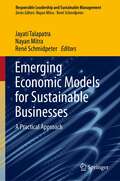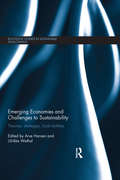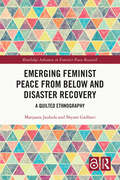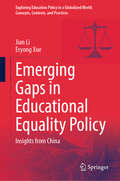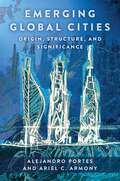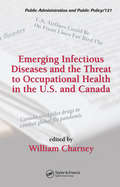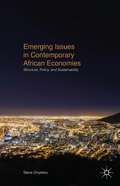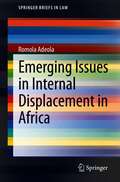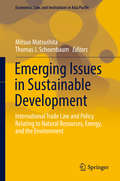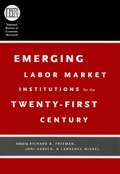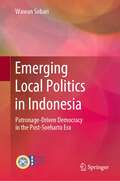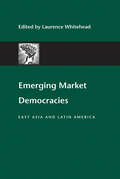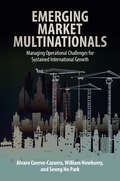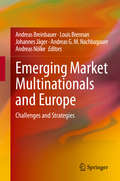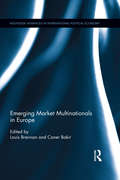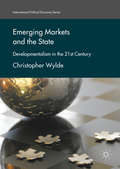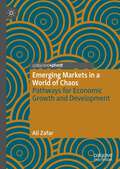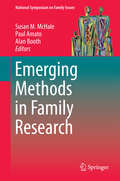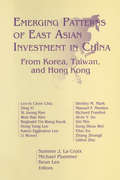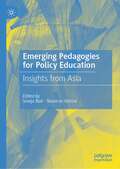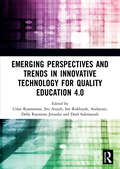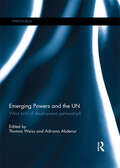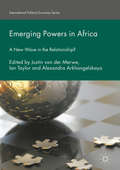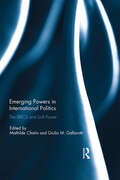- Table View
- List View
Emerging Economic Models for Sustainable Businesses: A Practical Approach (Responsible Leadership and Sustainable Management)
by René Schmidpeter Nayan Mitra Jayati TalapatraThe book discusses new and emerging economic models, that respond to 'Pulling' and 'Pushing' forces. Today we are poised at an interesting juncture, with favourable conditions making it easier to be a sustainable organization acting as a ‘Pulling’ Force and the climate crisis, rise in social-economic equities thereby ‘Pushing’ for urgent action. The book analyses economic models that look at value propositions, creation and capture with ‘People, Planet and Profit’ deeply embedded in each stage of the value chain. The contributions bring out the interplay between new standards, evaluation frameworks, technology innovation and other emerging tools to show how they create a sustainable business. For this, they lean on learnings from successful sustainable businesses. Business leaders will find that this book provides deep insights on improving their existing sustainable practices, and speeding up the transition from linear to circular, narrow stakeholder driven to community driven. For prospective entrepreneurs the book provides the nudge needed to start up a sustainable enterprise. Students and researchers can benefit from real-life examples of how sustainable transformations unfold.The book thus creates an easy guide for those willing to make the transition to sustainability, start a sustainable business and most of all, to motivate those who may not yet be convinced about the long-term sense of taking care of our people and our earth.
Emerging Economies and Challenges to Sustainability: Theories, strategies, local realities (Routledge Studies in Sustainable Development)
by Arve Hansen Ulrikke WethalThe rise of emerging economies represents a challenge to traditional global power balances and raises the question of how we can combine sustainability with continued economic growth. Understanding this global shift and its impact on the environment is the paramount contemporary challenge for development-oriented researchers and policy makers alike. This book breaks new ground by combining scholarship on the role of emerging economies with research on sustainable development. The book investigates how the development strategies of emerging economies challenge traditional development theory and sustainability discourses. With regional introductions and original case studies from South Asia, East Asia, Latin America and Sub-Saharan Africa, it discusses how to conceptualise sustainable development in the global race for economic prosperity. What characterises the development strategies of emerging economies, and what challenges are these posing for global sustainable development? How can emerging economies shed light on the global challenges, dilemmas and paradoxes of the relationship between socio-economic improvements and environmental degradation? This book will be a valuable resource for researchers and postgraduates in development studies, geography, economics and environmental studies.
Emerging Federal Structures in the Post-Cold War Era (Federalism and Internal Conflicts)
by Soeren Keil Sabine KroppThis book conceives federalism not as a static institutional architecture, but as a dynamic formation always in flux. This may entail processes of federalization, but in some cases also lead to de-federalization. It looks at emerging federal structures worldwide and analyses federal structures: their emergence, operation and categorization. The contributors highlight that the “emergence” of these federal structures has multiple facets, from the recognition of ethnic diversity to the use of federalism as a tool of conflict resolution. Identifying and categorizing processes of federalization and defederalization in a variety of cases, the book provides much needed empirical and theoretical discussion on emerging federal structures and the changing nature of federalism in the post-Cold War era.
Emerging Feminist Peace from Below and Disaster Recovery: A Quilted Ethnography (Routledge Advances in Feminist Peace Research)
by Marjaana Jauhola Shyam GadhaviThis book offers a critical contribution to feminist peace and disaster research by challenging the successful disaster recovery narrative of the Kachchh 2001 earthquake in Gujarat, India.Engaging in a feminist intersectional analysis of complex cascades of violence, the book uses a theoretical and methodological approach to studying cascades of violence of populist post-disaster recovery, communal violence, and urban development - each with implications for intersectional social divisions, ecology, and thus, everyday peace. The book follows the mundane everyday and life-historical trajectories of the residents of the temporary shelter neighbourhood in Bhuj, drawing attention to an emerging feminist peace from below through silent resistance, care, and solidarity. It demonstrates that the impacts of disaster populism in the name of being "pro-poor" do not impact the marginalised segments of the society and disaster-affected communities, even within the same neighbourhood of the dispossessed, in the same ways. Combining underexplored newspaper and project documentation archives, the speeches of Narendra Modi delivered in Kachchh, and urban life historical ethnography, the book offers a rich analysis of gendered and intersectional experiences of how dispossession and mundane violence are embedded in the earthquake recovery – and how international humanitarian aid and urban disaster recovery are entangled with complex cascades of violence.This book will be of much interest to students of feminist theory, peace studies, post-disaster recovery, and South Asian politics.The Open Access version of this book, available at www.taylorfrancis.com, has been made available under a Creative Commons Attribution (CC-BY) 4.0 license.
Emerging Gaps in Educational Equality Policy: Insights from China (Exploring Education Policy in a Globalized World: Concepts, Contexts, and Practices)
by Jian Li Eryong XueThis book explores various gaps in education and educational equality policy in China. It discusses the emerging gaps in students&’ information literacy, teachers&’ information literacy, different school quality, teaching quality, access to funding, extracurricular education, family education, and teachers&’ academic levels. It also provides critical reflections and arguments on how to explain and analyze the emerging gaps in education, and how to reduce these gaps and promote educational equality in China. This book serves as an useful resource for researchers, policy makers, and other stakeholders in the field of education.
Emerging Global Cities: Origin, Structure, and Significance
by Alejandro Portes Ariel C. ArmonyCertain cities—most famously New York, London, and Tokyo—have been identified as “global cities,” whose function in the world economy transcends national borders. Without the same fanfare, formerly peripheral and secondary cities have been growing in importance, emerging as global cities in their own right. The striking similarity of the skylines of Dubai, Miami, and Singapore is no coincidence: despite following different historical paths, all three have achieved newfound prominence through parallel trends.In this groundbreaking book, Alejandro Portes and Ariel C. Armony demonstrate how the rapid and unexpected rise of these three cities recasts global urban studies. They identify the constellation of factors that allow certain urban places to become “emerging global cities”—centers of commerce, finance, art, and culture for entire regions. The book traces the transformations of Dubai, Miami, and Singapore, identifying key features common to these emerging global cities. It contrasts them with “global hopefuls,” cities that, at one point or another, aspired to become global, and analyzes how Hong Kong is threatened with the loss of this status. Portes and Armony highlight the importance of climate change to the prospects of emerging global cities, showing how the same economic system that propelled their rise now imperils their future. Emerging Global Cities provides a powerful new framework for understanding the role of peripheral cities in the world economy and how they compete for and sometimes achieve global standing.
Emerging Infectious Diseases and the Threat to Occupational Health in the U.S. and Canada (Public Administration and Public Policy)
by William CharneyHospitals in the US and Canada are ill-prepared for the threat of emerging infectious diseases, especially in the area of protecting healthcare workers, nurses, doctors, and first responders from transmissions. Current protocols from guideline agencies and health organizations and health departments that include state pandemic flu plans do not foll
Emerging Issues In Contemporary African Economies
by Steve OnyeiwuIn Emerging Issues in Contemporary African Economies, Onyeiwu focuses on how events of the twenty-first century are shaping key sectors of African economies and societies. He argues that while there have been significant improvements in African economies, major challenges still remain. Onyeiwu implicitly adopts an evolutionary methodology that recognizes the capacities of African countries to learn from past policy mistakes, experiment with new policy initiatives, and adapt to evolvingeconomic challenges and opportunities. This great contribution to the literature explores new themes that have become central to the sustainable performance of African economies: the IT revolution, industrial dynamics, innovation and technological change, youth and gender, as well as issues around structural transformation.
Emerging Issues in Internal Displacement in Africa (SpringerBriefs in Law)
by Romola AdeolaThis book focuses on emerging issues related to internal displacement in Africa. The six principal issues discussed are climate change, technology, xenophobia, harmful practices, generalized violence and development projects. Increasingly, the need to understand the root causes of the dimensions of internal displacement and the dimensions in which this displacement manifests have become a pertinent rhetoric in the discussion on internal displacement. Therefore, this monograph examines emerging issues for which there is very little in the internal displacement discussion, with the aim of providing knowledge within African regional contexts to advance law and policy formation. The novelty of this book lies in the fact that it moves beyond the conventional discussion on internal displacement into grey areas on the subject in Africa, leveraging the African Union Convention for the Protection and Assistance of Internally Displaced Persons (the Kampala Convention). This book will be a significant reference point for researchers, professors, practitioners, judges, policy makers, international organizations, regional bodies, lawyers and scholars in the fields of migration, forced migration, and regional institutions.
Emerging Issues in Sustainable Development
by Mitsuo Matsushita Thomas J. SchoenbaumThis book seeks to answer the questions: how do the rules of international treaties on trade and investment apply to the new laws and policies relating to energy-related trade, and do the rules of the multilateral system contribute to or detract from sustainable development? An emerging set of new problems in the law of international trade is how to reconcile the rules of the multilateral trading system with shortages of certain natural resources and the necessity to develop renewable energy resources. The chapters in this book provide a comprehensive analysis of the international trade issues presented by national trade laws and policies with regard to natural resources and energy. This book is about the extent to which we are interpreting existing rules to cover emerging problems and how the rules of the multilateral trading system can be adapted to achieve sustainable development in natural resources and energy. The book begins with a survey of selected national laws relating to recent restrictions on the export of natural resources, both resources used to produce energy as well as natural resources essential for industrial production. After examining the range of such laws in selected important countries, we turn to the application of the rules of the multilateral trading system to such export restrictions. We discuss the major rules of the World Trade Organization (WTO) as well as the natural resources rules in selected regional preferential free trade agreements. While there is not a comprehensive global legal regime on competition law, we believe it is also important to examine how selected national competition laws impact export restrictions on natural resources. This book will be a major contribution to the international dialogue on international economic law issues with respect to trade in natural resources and energy.
Emerging Labor Market Institutions for the Twenty-First Century (National Bureau of Economic Research Conference Report)
by Richard B. Freeman Lawrence Mishel Joni HerschThe text provides an in-depth assessment of how effectively labor market institutions are responding to the decline of private sector unions. This volume provides case studies of new labor market institutions and new directions for existing institutions. While non-union institutions are unlikely to fill the gap left by the decline of unions, the findings suggest that emerging groups and unions might together improve some dimensions of worker well-being. Emerging Labor Market Institutions is the story of workers and institutions in flux, searching for ways to represent labor in the new century.
Emerging Local Politics in Indonesia: Patronage-Driven Democracy in the Post-Soeharto Era
by Wawan SobariThis book provides a richer understanding of democratic local politics in Indonesia after the implementation of local direct elections in 2005. Co-published with the University of Airlangga Press, it confronts the question as to why incumbent political leaders succeed and fail in their bid for re-election. By focusing on urban and rural districts in East Java, one of the most populated regions in Indonesia, the work unpacks the general trends of local Indonesian politics, drawing from an empirically sound and theoretically well-grounded case study. The author demonstrates that good policy performance does not guarantee the political survival of the incumbent, and reversibly, bad policy performance does not necessarily mean losing political power. It considers the core political strategies of populism, rivalry, and tangibility and cautions that—rather than helping liberal democracy to grow—these strategies support patronage-driven democracy. Within this system, a small number of vital protectors and defenders control patronage, and, problematically, exert influential control over the country’s electoral processes. Relevant to scholars and students in Indonesian studies, and within political science and Asian studies more broadly, this book follows a gripping and nuanced narrative that explains the relationship between policy choices, informal politics, voting behavior, and political survival in Indonesia.
Emerging Market Democracies: East Asia and Latin America (A Journal of Democracy Book)
by Laurence WhiteheadThe end of the Cold War, the "third wave" of democratization, and economic globalization have presented the newly industrialized countries of East Asia and the liberal democracies of Latin America with increasingly similar international opportunities and constraints. During the 1980s, Latin America made great strides in democratization, while East Asia led the world in economic growth. Are the two regions now converging toward a model that combines economic and political liberalization? Many developments in both regions indicate that this is a serious possibility. Although significant countertrends do exist, there is now increased scope for mutual support and encouragement among aspiring democratic forces both within and between these two regions. This book examines these interrelated issues, paying special attention to the effects of the East Asian financial crisis of 1997–98 and its subsequent impact on Latin America.Contributors: Ananya Basu, World Bank; Francis Fukuyama, School of Advanced International Studies, Johns Hopkins University.; Stephan Haggard, University of California-San Diego; Elizabeth M. King, World Bank; Sanjay Marwah, George Mason University; Sylvia Maxfield, Harvard University; Eduardo Silva, University of Missouri-St. Louis and University of Miami; Gordon Redding, University of Hong Kong; Tun-jen Cheng, College of William and Mary; Yun-han Chu, National Taiwan University; Laurence Whitehead, Oxford University.
Emerging Market Multinationals
by Park Seung Ho Cuervo-Cazurra Alvaro William NewburryWhy have relatively poor and underdeveloped countries been able to spawn so many global firms in the last two decades? Are emerging market multinationals (EMNCs) really different from successful multinationals from developed economies? This book tackles these and other fundamental theoretical questions about EMNCs. A distinguished group of researchers assesses the unique strategies and behavior of successful EMNCs, from the Chinese telecommunications firm Huawei to the Indian conglomerate Tata, to the South African beverages firm SABMiller. They address a range of topics, such as the drivers of internationalization by EMNCs; their distinctive process capabilities; how they catch up with established rivals on technology; how state ownership or business-group affiliation affects their behavior; and why they sometimes relocate their headquarters to advanced economies. This book will appeal to scholars and graduate students in global strategy and international business, as well as consultants of multinational companies, looking for state-of-the-art analysis of EMNCs.
Emerging Market Multinationals and Europe: Challenges and Strategies
by Andreas Nölke Louis Brennan Johannes Jäger Andreas Breinbauer Andreas G. M. NachbagauerRecently, there have been public concerns about the impact of emerging market multinationals. The expansion of China's multinationals to Europe and the Belt and Road Initiative is a prominent example that has kindled hope but also started to increase awareness of the long-term implications. Based on a systematic analysis of internationalization theories, the role of foreign direct investment and multinational companies combined with in-depth empirical research using case studies in Turkey, Russia, Latin America, Asia and Europe, this timely edited volume addresses opportunities and concerns related to this new trend. It also provides new insights that are highly relevant for scholars, policy makers, regional business agencies and students, as well as the public at large. By focusing on the (potential) impact of the expansion of emerging market multinationals on Europe and by including a long-term perspective, the book offers a fresh perspective on a highly controversial issue.
Emerging Market Multinationals in Europe (Routledge Advances in International Political Economy)
by Louis Brennan Caner BakirThis book makes a timely and highly stimulating contribution to the discourse on emerging-market multinationals, (EMNCs), as Foreign Direct Investment (FDI) in Europe from emerging countries (especially from the BRICs - Brazil, Russia, India, China) continues to grow in significance. Unsurprisingly, the emergence of EMNCs from emerging economies raises a wide range of challenges and opportunities for scholars, business professionals, and policymakers alike. While explaining the sudden rise of these companies has become a major concern among scholars, we have very limited knowledge on drivers, motivations, strategies, and impact of these EMNCs in Europe and their policy implications. This volume provides fresh insights into EMNCs activities and their impact in Europe. The contributors argue that EMNCs combine various country specific advantages, existing firm-specific advantages (exploitation), and/or new FSAs (exploration) in their FDI, and that there is considerable heterogeneity across EMNCs, even those from the same southern economy. Highlighting the importance of considering this divergent behaviour when implementing future European FDI policies, this book will be of interest to students and scholars of European Politics, International Political Economy, International Business and European Integration.
Emerging Markets and the State
by Christopher WyldeThis book, through an analysis of case studies in Latin America and Southeast Asia, sets out to understand the form and function of contemporary states seeking to guide and cajole markets, hoping to stimulate economic growth and generate robust development outcomes. In the context of contemporary globalization, and the hegemony of a neoliberal mode of capital accumulation, independent state-directed development has moved away from the reach of many emerging markets. Wylde's analysis reveals that, contrary to much of the literature espousing the 'end of the state', the role of the state in the 21st century development process continues to be of pivotal importance.
Emerging Markets in a World of Chaos: Pathways for Economic Growth and Development
by Ali ZafarThis book is a journey through leading and incredibly diverse emerging markets in a world of shocks and transitions. Tracing the rise of China, the emergence of India, the changing fortunes in Brazil, Argentina, and Mexico, the unique developments in Turkey and Indonesia, the complex geopolitics in Russia and Saudi Arabia, and the challenging post-apartheid transition in South Africa, the study examines their varying prospects in the years to come. Using an innovative analytical approach and rich empirics, the book delves into topics ranging from macroeconomics to human development, institutions to climate change. It provides a strategic roadmap of reform for these economies to escape the middle-income trap. It argues that in a world where advanced economies are defined by slowdown, growing trade blocs, changing demographics, and the rise of renewable technologies, emerging markets will continue to play a significant but complex role in the twenty-first century.
Emerging Methods in Family Research
by Alan Booth Susan M. Mchale Paul AmatoThe family can be a model of loving support, a crucible of pathology, or some blend of the two. Across disciplines, it is also the basic unit for studying human relationships, patterns of behavior, and influence on individuals and society. As family structures evolve and challenge previous societal norms, new means are required for understanding their dynamics, and for improving family interventions and policies. Emerging Methods in Family Research details innovative approaches designed to keep researchers apace with the diversity and complexities of today's families. This versatile idea-book offers meaningful new ways to represent multiple forms of diversity in family structure and process, cutting-edge updates to family systems models and measurement methods, and guidance on the research process, from designing projects to analyzing findings. These chapters provide not only new frameworks for basic research on families, but also prime examples of their practical use in intervention and policy studies. Contributors also consider the similarities and differences between the study of individuals and the study of family relationships and systems. Included in the coverage: Use of nonlinear dynamic models to study families as coordinated symbiotic systems. Use of network models for understanding change and diversity in the formal structure of American families. Representing trends and moment-to-moment variability in dyadic and family processes using state-space modeling techniques. Why qualitative and ethnographic methods are essential for understanding family life. Methods in multi-site trials of family-based interventions. Implementing the Multiphase Optimization Strategy (MOST) to analyze the effects of family interventions. Researchers in human development, family studies, clinical and developmental psychology, social psychology, sociology, anthropology, and social welfare as well as public policy researchers will welcome Emerging Methods in Family Research as a resource to inspire novel approaches to studying families.
Emerging Patterns of East Asian Investment in China: From Korea, Taiwan and Hong Kong
by Sumner J.La CroixFocuses on the recent surge of foreign and Taiwan investment to mainland China's coastal provinces. The 15 papers presented in this text provide data on the emerging pattern of East Asian investments in China and an understanding of the mistakes of early investors.
Emerging Pedagogies for Policy Education: Insights from Asia
by Sreeja Nair Navarun VarmaThis edited book captures key trends that are driving changes in policy education and presents a repertoire of pedagogies to prepare educators and policy programme designers to teach for better impact in learning and policy practice. Supported with observations from selected Asian universities the chapters cover the experiences of authors in working with students at undergraduate and postgraduate levels, as well as professional programmes such as executive education, training, and capacity building for mid-career professionals and practitioners. Part I of this book presents ideas that are asserting the need for incorporation of new content as well as teaching practices for policy education. Part II covers selected cases of application of pedagogical approaches and strategies in Asian universities, tested at different education levels, modes of teaching, and disciplines.
Emerging Perspectives and Trends in Innovative Technology for Quality Education 4.0: Proceedings of the 1st International Conference on Innovation in Education and Pedagogy (ICIEP 2019), October 5, 2019, Jakarta, Indonesia
by Siti Aisyah Isti Rokhiyah Andayani Della Raymena Jovanka Dodi Sukmayadi Udan KusmawanIndustrial Revolution 4.0 has dramatically changed the business and social landscape, including human behavior not only in advanced countries but also in emerging countries. Technology development affects many aspects in our society, including education. Distance learning, big data and analytics, artificial intelligent and many digital innovations have been released to improve better quality education in our society. These proceedings provide selected papers/research about innovative digital technology in education and pedagogy in Industrial revolution 4.0 covering issues like: pedagogy, education management, early childhood education, research in education, training and vocational education and social science education, earth science education and art/linguistic education related to digital innovation.This book provides details beyond what is possible to be included in an oral presentation and constitute a concise but timely medium for the dissemination of recent research results. It will be invaluable to professionals and academics in the field of education and pedagogy to get an understanding of recent research.
Emerging Powers and the UN: What Kind of Development Partnership? (ISSN)
by Thomas G. Weiss and Adriana Erthal AbdenurThe post-2015 goals and the changing environment of development cooperation will demand a renewed and strengthened UN development system. In line with their increasing significance as economic powers, a growing number of emerging nations will play an expanded role in the UN development system. These roles will take the form of growing financial contributions to individual organizations, greater weight in governance structures, higher staff representation, a stronger voice in development deliberations, and a greater overall influence on the UN development agenda. Emerging Powers and the UN explores in depth the relationship of these countries with, and their role in, the future UN development system. Formally, the relationship is through representation as member states (first UN) and UN staff (second UN). However, the importance of the non-public sector interests (third UN) of emerging economies is also growing, through private sponsorship and NGO activities in development. This book was originally published as a special issue of Third World Quarterly.
Emerging Powers in Africa
by Ian Taylor Justin van der Merwe Alexandra ArkhangelskayaThis empirically and theoretically grounded book provides insights into the ascendance of powers such as Turkey, South Korea and Indonesia and their relationship with Africa. Leading scholars present case studies from the BRICS and beyond to demonstrate the constantly evolving and complex character of these ties and their place in the global capitalist order. They also offer new theoretical insights, as well as theorisation of the spatio-temporal dynamics involved in processes of accumulation within the African space. Their contention is that, despite their supposed anti-imperialism, these emerging powers have become agents for continued uneven development. This innovative edited collection will appeal to students and scholars of international relations, political science, development studies, area studies, geography and economics.
Emerging Powers in International Politics: The BRICS and Soft Power
by Giulio M. Gallarotti Mathilde ChatinThe rise of large and rapidly growing nations is having a significant impact on the global order, as their expanding influence reshapes the structure of power in the international system. These emerging powers are increasingly asserting themselves as major actors on the global scene. Leading this cadre of emerging powers are five nations referred to as the BRICS – Brazil, Russia, India, China and South Africa. This book takes inventory of both the individual and collective soft power of this rising bloc of nations. Having embraced the potential of this newly emphasized type of power as a means of generating international influence, these nations have dedicated substantial effort and resources to implementing a soft power offensive.This book was originally published as a special issue of the Journal of Political Power.
